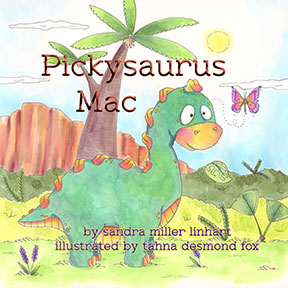
When food tastes like mud, smells like trash, and feels like mush, what’s a hungry dinosaur to do?
His friends tell him to eat right to stay healthy but some things you just can’t fix with words.
Will Pickysaurus Mac ever find something he likes? When he finds he likes it, will it be the best food for him? Will he find it in time?
Pickysaurus Mac is not your typical dinosaur. Mealtimes pose a special problem for our little friend. Sometimes foods smell too gross to eat, they taste different than they look, and their textures feel like garbage in his mouth.
Children with Sensory Processing Disorder, or SPD, must learn to navigate the crossed sensory receptors between their senses and their brain. Symptoms span a wide range, between being oversensitive or under-sensitive to stimulation of any or all of their senses. Foods pose a particular problem in the SPD child. Learning to tolerate textures, smells, and tastes sometimes makes mealtimes traumatic.
“Pickysauraus Mac is a must for sensory-challenged children, their parents and teachers. Using colorful graphics and lilting rhyme, Pickysuarus demonstrates the challenges and difficulties of those with Sensory Processing Disorder.
“A recently recognized neurological disorder, SPD responds to behavioral therapies designed to build tolerance to discomfort created by the condition. While not “curable,” those with SPD are able to lead healthy, full, and productive lives.
“Children (and teens) long to be part of the crowd and not feel different or left out. Learning of a delightful dinosaur experiencing the same anti-food struggles lets the SPD child know they are not alone. Pickysaurus Mac provides insight to their condition and establishes the need for change while validating the child’s distress. An excellent resource for the child and their caregiver. Pickysaurus promotes acceptance and understanding of a complex and demanding disorder.” Julie Cox, MS